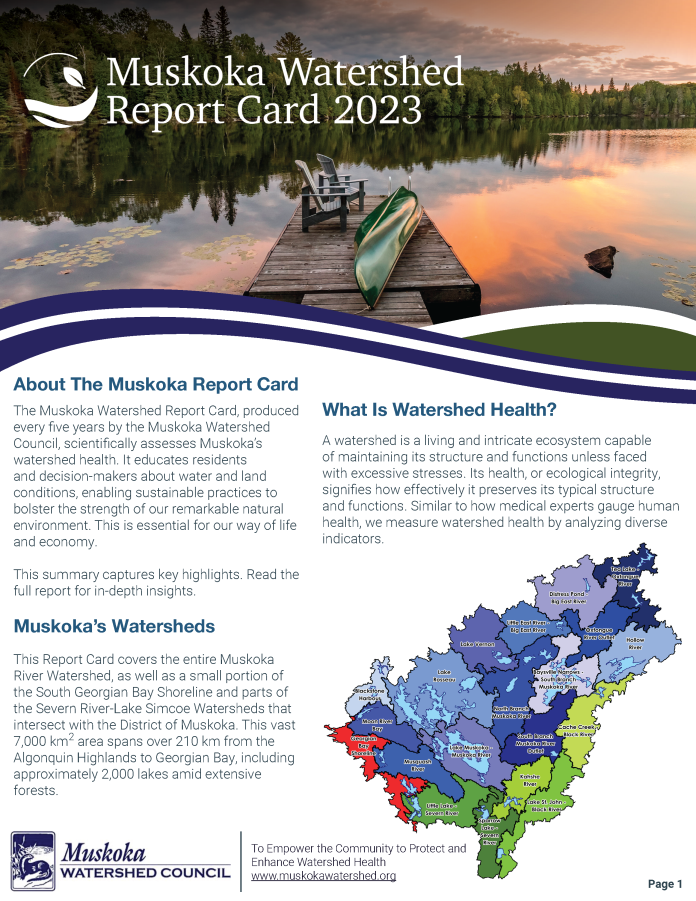Muskoka Watershed Council (MWC) is pleased to release the latest edition of the Muskoka Watershed Report Card, a comprehensive scientific assessment of the health of Muskoka’s watersheds. Produced every five years, this report card provides critical insights into the state of our watershed, offering valuable information to both residents and decision-makers. The Muskoka Watershed Report Card serves as an essential tool to guide sustainable practices to preserve our remarkable natural environment, supporting both our way of life and economy.
The health of the watershed, or its ecological integrity, is a measure of its ability to maintain its structure and functions under varying stresses. Just as medical experts assess human health using a range of diagnostic tools, we gauge watershed health through diverse indicators.
So, just how healthy is the Muskoka watershed? “Muskoka’s watersheds stand at a crucial turning point,” warns Peter Sale, Chair of MWC. “While currently healthy, they are gradually degrading in several ways, and our existing management systems seem incapable of halting or reversing this negative trend. We need an integrated, watershed-scale management system capable of dealing with the multiple stresses our iconic environment now faces.”
The background report offers insights into 14 key indicators and highlights various concerning trends affecting the watershed’s health. These include:
- Climate Impacts: We can observe evidence of local climate change in our local weather records. This shifting climate is causing various effects on our watershed ecosystem, and it is paving the way for ongoing changes in the years to come. These changes are influencing biodiversity, our economy, and our daily lives.
- Ice Dynamics: Over the past two decades, the duration of winter ice coverage has fallen by 20 days, impacting winter recreation, tourism, the construction industry, and lake dynamics – the way in which our lakes function ecologically.
- Severe Storms: Since 2000, the watershed has seen twice as many severe storms compared to the 30 years before that time. Spring flooding is caused by a combination of high snowpack, rapid snowmelt, and heavy rain during the thaw.
- Chloride Increase: Lakes are becoming saltier, with 70% now exceeding their natural salt levels, and 24% have chloride levels that threaten aquatic life.
- Calcium Decline: Soil and lake calcium levels have been declining due to acid rain, changing land use, and climate change. This decline affects critically important aquatic organisms like Daphnia and other zooplankton, which rely on calcium for skeleton formation.
- Algal Bloom Increase: Harmful algae blooms, including toxic blue-green varieties, are becoming more common, impacting the beauty and economy of the region while raising health risks.
These trends can’t be addressed independently of each other, nor with local actions alone. MWC highlights the importance of adopting comprehensive solutions across the entire watershed. An Integrated Watershed Management (IWM) approach allows consideration of multi-disciplinary solutions, coordinated across municipalities. This approach will benefit communities and the economy; and it can be incorporated into land use policy, climate action, infrastructure planning and environmental initiatives.
“This approach is crucial to enhancing watershed health, promoting sustainable economies, fortifying community well-being, and building resilience against climate change and other stressors,” highlights Kevin Trimble, a Director with the Muskoka Watershed Council. “Collaborative efforts among individuals, businesses, and governments are essential to effectively address the intricate challenges impacting the watershed and strive for a sustainable future. The time is now for everyone to stand up and take action to safeguard the health of the Muskoka watershed,” Kevin emphasizes.
The Muskoka Watershed Council urges active engagement within the community: Encouraging leaders to make bold choices for a healthier environment, advocating for Integrated Watershed Management, and supporting local environmental groups’ diligent efforts. Every small action contributes to our collective endeavor to enhance resilience, preserve the ecological integrity of Muskoka’s iconic environment, economy, and way of life. Together, we can create change and work towards a sustainable future for Muskoka.
Muskoka Watershed Council – To Empower the Community to Protect and Enhance Watershed Health.








